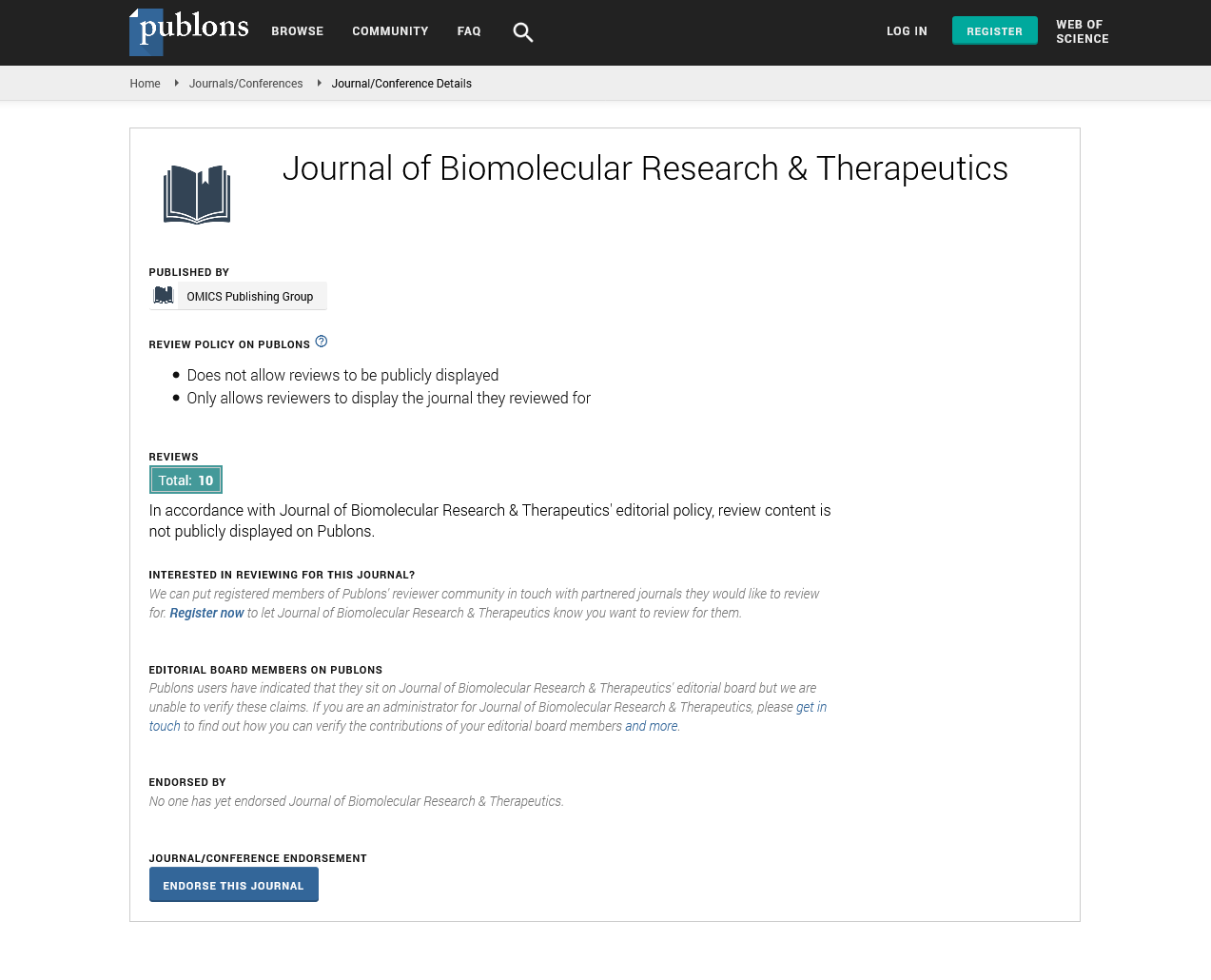Indexed In
- Open J Gate
- Genamics JournalSeek
- ResearchBible
- Electronic Journals Library
- RefSeek
- Hamdard University
- EBSCO A-Z
- OCLC- WorldCat
- SWB online catalog
- Virtual Library of Biology (vifabio)
- Publons
- Euro Pub
- Google Scholar
Useful Links
Share This Page
Journal Flyer

Open Access Journals
- Agri and Aquaculture
- Biochemistry
- Bioinformatics & Systems Biology
- Business & Management
- Chemistry
- Clinical Sciences
- Engineering
- Food & Nutrition
- General Science
- Genetics & Molecular Biology
- Immunology & Microbiology
- Medical Sciences
- Neuroscience & Psychology
- Nursing & Health Care
- Pharmaceutical Sciences
Opinion Article - (2023) Volume 12, Issue 10
The RNA Revolution: Transforming Disease Treatment with RNA Therapeutics
Semanur Dinçer*Received: 04-Sep-2023, Manuscript No. BOM-23-23606; Editor assigned: 07-Sep-2023, Pre QC No. BOM-23-23606(PQ); Reviewed: 28-Sep-2023, QC No. BOM-23-23606; Revised: 05-Oct-2023, Manuscript No. BOM-23-23606(R); Published: 12-Oct-2023, DOI: 10.35248/2167-7956.23.12.339
Description
RNA therapeutics, a revolutionary field in the world of medicine and biotechnology, holds the potential to transform the way we treat a wide range of diseases, including genetic disorders, infectious diseases, and cancer. Over the past few decades, RNAbased approaches have gained immense popularity and recognition, leading to the development of innovative therapies that leverage the unique properties of Ribonucleic Acid (RNA). In this revolution explores the diverse landscape of RNA therapeutics, shedding light on the various types of RNA molecules used, their mechanisms of action, current applications, and the remarkable potential they hold for the future of medicine. Before delving into the world of RNA therapeutics, it's essential to understand the basic principles of RNA. RNA (ribonucleic acid) is a nucleic acid molecule that plays a key role in the transfer of genetic information within cells. There are three main types of RNA messenger RNA (mRNA), ribosomal RNA (rRNA), and transfer RNA (tRNA). While mRNA carries the genetic instructions for protein synthesis, rRNA is a structural component of the ribosome, and tRNA is involved in the actual translation of mRNA into proteins. In the context of RNA therapeutics, two types of RNA molecules are of particular interest in small interfering RNA (siRNA) and messenger RNA (mRNA).
Small interfering RNA, often abbreviated as siRNA, is a class of RNA molecules that has garnered significant attention in the field of RNA therapeutics. siRNA is double-stranded and typically 20-25 nucleotides long. Its primary function is to silence specific genes by inhibiting the expression of their corresponding proteins. This gene-silencing mechanism makes siRNA a potent tool for treating diseases caused by the overexpression or malfunction of specific genes. siRNA-based therapeutics have shown great promise in the treatment of various diseases, particularly genetic disorders, viral infections, and certain types of cancer. One of the most notable successes in the field of siRNA therapeutics is the FDA-approved drug Onpattro, which is used to treat hereditary transthyretin-mediated amyloidosis.
Applications of RNA therapeutics
RNA therapeutics show capacity in treating genetic disorders by correcting or compensating for faulty genes. This approach can potentially offer hope to individuals with conditions such as Huntington's disease, cystic fibrosis, or muscular dystrophy. RNA-based therapies can be used to target viruses or bacteria by inhibiting their replication. This approach has been demonstrated in the development of antiviral drugs and, most notably, in the creation of mRNA vaccines to combat the COVID-19 pandemic. The ability to silence specific genes or induce the expression of therapeutic proteins has led to the development of innovative cancer therapies. RNA therapeutics can target cancer cells with precision, minimizing damage to healthy cells. mRNA-based immunotherapies are being explored as a means of enhancing the immune response to cancer and infectious diseases. These therapies can stimulate the immune system to recognize and destroy specific targets, such as tumor cells or pathogens. RNA therapeutics gives faith for individuals with rare diseases that lack effective treatments. By targeting the root cause of the condition at the genetic level, RNA-based therapies hold the potential to provide relief and improve the quality of life for patients with rare diseases.
Advantages of RNA therapeutics
RNA therapeutics can be designed with high specificity, targeting specific genes or proteins. This precision minimizes off-target effects and reduces the risk of adverse reactions. The modular nature of RNA allows for the development of customized therapies for various diseases, making it a versatile tool in the field of medicine. The development of RNA therapeutics, especially mRNA vaccines, can be faster than traditional vaccine production methods. This rapid response is vital during pandemics and emerging infectious diseases. Unlike antibiotics or some small-molecule drugs, RNA-based therapies may have a lower risk of resistance development in pathogens. RNA therapeutics can be modified to an individual's genetic profile, enabling personalized medicine and the treatment of genetic diseases based on a patient's unique needs.
Citation: Dincer S (2023) The RNA Revolution: Transforming Disease Treatment with RNA Therapeutics. J Biol Res Ther. 12:339.
Copyright: © 2023 Dincer S. This is an open access article distributed under the terms of the Creative Commons Attribution License, which permits unrestricted use, distribution, and reproduction in any medium, provided the original author and source are credited.

